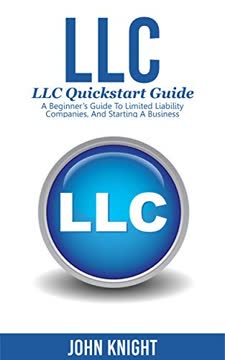Key Takeaways
1. LLCs offer liability protection and tax flexibility for business owners
One of the most basic reasons that people in business choose to form an LLC is to protect themselves in the event that they get sued.
Limited liability protection. LLCs provide a shield between the business and personal assets of the owners, protecting them from business debts and legal issues. This separation is crucial for entrepreneurs who want to minimize personal risk while running their business.
Tax flexibility. LLCs can choose how they want to be taxed, either as a pass-through entity or as a corporation. This flexibility allows business owners to optimize their tax strategy based on their specific needs and circumstances. Pass-through taxation means the business itself doesn't pay taxes; instead, profits and losses are reported on the owners' personal tax returns.
2. Forming an LLC requires careful consideration of state rules and naming conventions
You can call your state's LLC office and ask whether or not your chosen LLC name is available to you before you write it on your paperwork.
State-specific requirements. Each state has its own rules and regulations for forming an LLC. These may include:
- Naming conventions (e.g., including "LLC" or "Limited Liability Company" in the name)
- Filing fees
- Required documents (Articles of Organization, Operating Agreement)
- Publication requirements in local newspapers
Naming process. Choosing a unique and compliant name for your LLC is crucial. Consider:
- Checking name availability with the state office
- Avoiding trademark infringement
- Using required designators (e.g., "LLC" or "Limited Liability Company")
- Adhering to state-specific naming restrictions
3. The Operating Agreement is crucial for defining LLC structure and member rights
The Operating Agreement describes how the business will be run and will break down the rights of each of the LLC's partners.
Key components. A well-drafted Operating Agreement should include:
- Ownership percentages and capital contributions
- Voting rights and decision-making processes
- Profit and loss allocation
- Management structure (member-managed or manager-managed)
- Rules for admitting new members or handling member exits
- Dissolution procedures
Customization and flexibility. The Operating Agreement allows LLC members to customize their business structure and override default state rules. This flexibility is one of the main advantages of choosing an LLC over other business entities. It's essential to carefully consider and negotiate the terms of the Operating Agreement to ensure it aligns with all members' interests and expectations.
4. LLCs can choose between pass-through or corporate taxation methods
If you find that you will be keeping a large amount of profits in your LLC bank account on a regular basis for expenses, you may want to consider choosing to have your corporation taxed as a corporate entity instead.
Pass-through taxation. By default, LLCs are taxed as pass-through entities:
- Single-member LLCs are treated as sole proprietorships
- Multi-member LLCs are treated as partnerships
- Profits and losses "pass through" to members' personal tax returns
- LLC itself doesn't pay federal income taxes
Corporate taxation option. LLCs can elect to be taxed as corporations by filing Form 8832 with the IRS:
- Beneficial for LLCs retaining significant profits for business expenses
- Lower tax rates on the first $75,000 of income
- Allows for certain fringe benefits and stock options for members/employees
- May result in double taxation on distributed profits
5. Proper accounting and record-keeping are essential for LLC compliance
Even though an LLC does not pay taxes itself, there are still some records that must be kept for tax purposes and in order to pay its members.
Essential records. LLCs must maintain:
- Chart of accounts (assets, liabilities, owner's equity, revenue, expenses)
- Daily financial entries (income, expenses, member distributions)
- Pass-through payment records for tax reporting
- Annual financial statements
- Meeting minutes (if required by state or Operating Agreement)
Accounting best practices:
- Use accounting software to track finances accurately
- Keep business and personal finances separate
- Regularly reconcile accounts and review financial statements
- Consult with a tax professional for guidance on deductions and compliance
6. LLC members have specific rights and responsibilities outlined in the Operating Agreement
As a member of an LLC, you have the right to see records and stay up to date on any financial statements, or any other significant records within the LLC.
Member rights typically include:
- Access to LLC records and financial information
- Participation in management decisions (for member-managed LLCs)
- Receiving distributions according to the Operating Agreement
- Voting on major LLC decisions
- Right of first refusal when another member wants to sell their interest
Member responsibilities may include:
- Making agreed-upon capital contributions
- Participating in management (for member-managed LLCs)
- Adhering to the Operating Agreement and state laws
- Disclosing conflicts of interest
- Maintaining the confidentiality of LLC information
7. Understanding LLC limitations helps protect members from personal liability
There are limitations to the liability in an LLC. Hence, it is called limited liability.
Situations where personal liability may apply:
- Committing fraudulent, illegal, or negligent acts
- Personally guaranteeing business debts or contracts
- Failing to maintain separation between personal and business finances
- Not following proper LLC formalities and record-keeping
- Engaging in reckless behavior that harms others
Best practices to maintain liability protection:
- Keep detailed records and maintain proper documentation
- Follow all state regulations and LLC formalities
- Clearly separate personal and business finances
- Avoid personally guaranteeing business debts when possible
- Obtain proper insurance coverage for the LLC and its activities
- Consult with legal and financial professionals regularly
Last updated:
Download PDF
Download EPUB
.epub digital book format is ideal for reading ebooks on phones, tablets, and e-readers.




